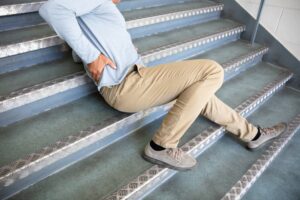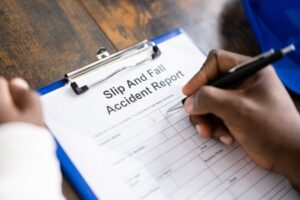Slip and fall accidents can happen anywhere, anytime, and to anyone. Whether walking through a grocery store, strolling down a city sidewalk, or visiting a friend's home, there's always a risk of slipping, tripping, or falling due to hazardous conditions. When these accidents occur, they can result in serious injuries, costly medical bills, and even long-term disabilities. But who is liable for a slip and fall accident? This is something you should always discuss with a slip and fall accident lawyer.
Understanding Premises Liability
Slip and fall accidents fall under the broader category of premises liability, which refers to a property owner's legal responsibility to maintain a safe environment for visitors. This means that property owners must take reasonable steps to identify and address potential hazards that can cause harm to others. If they fail to do so and someone suffers an injury, they may be liable for the victim's damages. However, not all slip and fall accidents result in automatic liability for the property owner. You must consider several factors when determining who is at fault.Key Factors in Determining Liability
To establish liability in a slip and fall case, the injured party (plaintiff) must generally prove the following elements:- The property owner owed a duty of care to the plaintiff
- The property owner breached that duty of care
- The breach of duty caused the plaintiff's injury
- The plaintiff suffered damages as a result of the injury
Duty of Care
The first step in determining liability is to establish that the property owner owed a duty of care to the injured party. You typically classify the visitor's status into three categories, which can vary the duty owed to them.- Invitees: People explicitly or implicitly invited onto the property for the owner's benefit, such as customers in a store or clients in an office building. Property owners owe the highest duty of care to invitees, meaning they must regularly inspect the premises, address any known hazards, and warn visitors of potential dangers.
- Licensees: People who enter the property for their purposes, with the owner's consent. Examples include social guests or salespeople. Property owners owe a moderate duty of care to licensees, meaning they must address known hazards and warn visitors of potential dangers. Still, they are not required to actively inspect the premises.
- Trespassers are people who enter the property without the owner's permission. Property owners generally do not owe a duty of care to trespassers, with some exceptions applying to children who may find hazardous conditions on the property appealing (known as the "attractive nuisance" doctrine).
Breach of Duty
Once established, a duty of care requires the plaintiff to demonstrate that the property owner breached that duty by not taking reasonable steps to remedy a hazardous condition. This can include things like:- Failing to clean up spills or debris promptly
- Neglecting to repair broken or uneven flooring
- Not providing adequate lighting in dark areas.
- Failing to install handrails or other safety features where necessary
Causation
Causation is a critical element in determining liability in a slip and fall case. The plaintiff must show that the property owner's breach of duty was the direct and proximate cause of their injury. In other words, they must demonstrate that the hazardous condition on the property was the primary reason for the accident and that the injury would not have occurred if the owner had taken reasonable steps to address the hazard. Proving causation can be challenging in a slip and fall case, particularly when multiple factors may have contributed to the accident. For example, if the plaintiff was wearing unsafe footwear, such as high heels or flip-flops, at the time of the fall, the property owner may argue that the plaintiff's choice of shoes contributed to the accident.
Similarly, suppose the plaintiff was distracted by their phone or not paying attention to their surroundings. In that case, the owner may claim that the plaintiff's negligence played a role in causing the injury.
In these situations, the plaintiff's attorney must gather evidence and build a strong case demonstrating the direct link between the property owner's negligence and the plaintiff's injury. This may involve presenting professional testimony from engineers, safety professionals, or medical professionals who can speak to the hazardous nature of the condition and the severity of the plaintiff's injuries.
The attorney may also need to refute any negligence claims by the property owner. This involves presenting evidence that the plaintiff was acting reasonably and taking necessary precautions at the time of the accident and that the hazardous condition on the property was the primary cause of the injury.
The standard for proving causation in a slip and fall case may vary depending on the specific circumstances of the accident and the laws of the state where the injury occurred. In some cases, the plaintiff may need to show that the property owner's negligence was the sole cause of the injury, while in others, they may only need to demonstrate that the owner's breach of duty was a substantial factor in causing the harm.
Ultimately, proving causation in a slip and fall case requires a thorough investigation of the accident, a clear understanding of the legal standards for liability, and a compelling presentation of the evidence. An experienced slip and fall attorney can help guide plaintiffs through this process and build a strong compensation case.
Proving causation can be challenging in a slip and fall case, particularly when multiple factors may have contributed to the accident. For example, if the plaintiff was wearing unsafe footwear, such as high heels or flip-flops, at the time of the fall, the property owner may argue that the plaintiff's choice of shoes contributed to the accident.
Similarly, suppose the plaintiff was distracted by their phone or not paying attention to their surroundings. In that case, the owner may claim that the plaintiff's negligence played a role in causing the injury.
In these situations, the plaintiff's attorney must gather evidence and build a strong case demonstrating the direct link between the property owner's negligence and the plaintiff's injury. This may involve presenting professional testimony from engineers, safety professionals, or medical professionals who can speak to the hazardous nature of the condition and the severity of the plaintiff's injuries.
The attorney may also need to refute any negligence claims by the property owner. This involves presenting evidence that the plaintiff was acting reasonably and taking necessary precautions at the time of the accident and that the hazardous condition on the property was the primary cause of the injury.
The standard for proving causation in a slip and fall case may vary depending on the specific circumstances of the accident and the laws of the state where the injury occurred. In some cases, the plaintiff may need to show that the property owner's negligence was the sole cause of the injury, while in others, they may only need to demonstrate that the owner's breach of duty was a substantial factor in causing the harm.
Ultimately, proving causation in a slip and fall case requires a thorough investigation of the accident, a clear understanding of the legal standards for liability, and a compelling presentation of the evidence. An experienced slip and fall attorney can help guide plaintiffs through this process and build a strong compensation case.
Damages
Finally, the plaintiff must show they suffered damages from the slip and fall accident. This can include things like:- Medical expenses for treating the injury
- Lost income from missing work during recovery
- Pain and suffering
- Emotional distress
- Loss of enjoyment of life
Negligence
In some cases, the plaintiff may be found partially at fault for their injury. This is known as negligence and can affect the compensation to which the plaintiff is entitled. Under a negligence system, the court will assign a percentage of fault to each party based on their relative contributions to the accident. For example, if the plaintiff bears 30 percent of the fault for their injury, they can recover 70 percent of their total damages from the property owner. Some states adhere to a "pure" negligence rule, allowing plaintiffs to recover damages even if they bear more than 50 percent of the fault. Other states employ a "modified" negligence rule, barring plaintiffs from recovering any damages if found to be 50 percent or more at fault.What to Do If You're Injured in a Slip and Fall Accident
If you suffered an injury in a slip and fall accident on someone else's property, there are several steps you should take to protect your health and your legal rights:Seek Medical Attention
One of the most important steps after a slip and fall accident is to seek medical attention as soon as possible. Even if your injuries are minor or you don't experience pain immediately, get checked out by a medical professional. Some injuries, such as concussions, whiplash, or internal bleeding, may not present symptoms right away, but they can have serious long-term consequences if left untreated. By seeking prompt medical care, you protect your health and well-being and establish a record of your injuries that can be valuable evidence in a potential legal case. Make sure to follow your doctor's treatment plan and attend all follow-up appointments to ensure proper healing and to demonstrate the extent of your injuries.Report the Accident
After a slip and fall accident, immediately notify the property owner or manager. If the accident occurred in a business, such as a store, restaurant, or office building, ask to fill out an incident report. This report should include details about the date, time, and location of the accident, as well as a description of the hazardous condition that caused your fall. If the property owner or manager is unavailable or refuses to complete an incident report, document the accident yourself. Write down the details of the incident while they are still fresh in your mind, and be sure to include any relevant information, such as the names and contact information of witnesses.
Reporting the accident promptly helps establish a record of the incident and puts the property owner on notice of the hazardous condition. This can be important in demonstrating that the owner had knowledge of the danger and failed to take reasonable steps to address it.
If the property owner or manager is unavailable or refuses to complete an incident report, document the accident yourself. Write down the details of the incident while they are still fresh in your mind, and be sure to include any relevant information, such as the names and contact information of witnesses.
Reporting the accident promptly helps establish a record of the incident and puts the property owner on notice of the hazardous condition. This can be important in demonstrating that the owner had knowledge of the danger and failed to take reasonable steps to address it.
